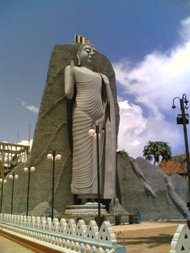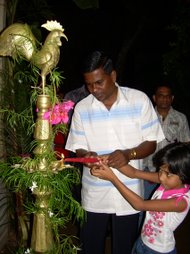Sundays without Suranimala
By Dharisha Bastians
As we waited, breath bated for three hours while doctors attempted to revive Lasantha Wickrematunga from fatal injury he had received last Thursday, there was communal anguish. We wept at the confirmation that he had succumbed to his injuries later that afternoon and as we marched in protest at his brutal murder, the anger and bitterness within the media community was tangible.
The cold blooded killing of The Sunday Leader Editor in Chief, Lasantha Wickrematunga has unleashed a wave of emotions in the Sri Lankan media fraternity over the last 72 hours. Yet, none of the shock nor grief seemed to hit quite so hard as the tragic sense of loss I was to feel at the grim realisation that ‘Suranimala’ would write no more. For those of us who live by what we write, there is no greater loss.
Lasantha first began writing under the nom-de-plume ‘Suranimala’ at the Island newspaper under the legendary Editor Vijitha Yapa. I was too young to have read that political column back then or when it was subsequently published in The Sunday Times in the early days of that newspaper. Yet, ever since print journalism became my career of choice, Politics with Suranimala has become staple Sunday fare. Few other Sunday columnists had the insight, analysis and spicy titbits that made up the Suranimala column and his 3,000 word full page piece would be savoured by both readers that required a healthy dose of political gossip and students of politics alike. The greatest allure was that Suranimala had what no other political columnist could lay claim to – that irresistible fly-on-the-wall perspective, which was possible only for someone with serious access to the corridors of power.
Indeed, Lasantha Wickrematunga was a political animal. But the thing is, he was a brilliant journalist in spite of it. Few could understand or agree with his brand of journalism. It is an anathema for a journalist, and especially one who lays claim to his own newspaper to mix politics with professionalism in the way that he did. Yet, for 14 years, he published a popular, if occasionally partisan, newspaper that the public never really tired of reading. There was space then, in this society for the kind of journalism Lasantha Wickrematunga believed in. Where others would cow down in fear, Lasantha thrived on constant badgering and harassment from the powers that be, fighting back tooth and nail when his press was sealed, his house attacked and his printing press burnt. All this because he believed the people deserved to know and the public devoured it week after week. In his death, it is this right of the people that has been grossly, brutally violated. Whether you agree with his brand of journalism or not, the greatest testimony to Lasantha Wickrematunga’s dissemination of information is the fact that he was killed last Thursday not because of his politics, but because of what he wrote. In Sri Lankan journalism, Lasantha leaves a void that cannot be filled simply because nobody else will even bother to try. It took an individual of extraordinary strength – perhaps even a politically motivated one – to face the fire and be willing to be engulfed in those flames.
I first met Lasantha four years ago, when he hired me to work as a reporter for The Sunday Leader. At the time, he didn’t know whether I could string a sentence together. For my part, I was terrified of seeing what I wrote in print. Yet, Lasantha not only gave me a job, he taught me to be a journalist. Green as I was behind the ears, he sent me out on assignments, to LTTE controlled areas of the north, to the restive east, on investigative assignments that scared the 24-year-old straight out of me. But I will remember him best for being the first of my editors to tell me, with a straight face, when I was overcome with self-doubt, that yes, I could in fact, write. In the year that I worked for Lasantha and The Sunday Leader there was no greater reward than to hear him say, ‘good job.’ I believe these sentiments would hold true for anyone who ever worked for Lasantha. Although I have seen or heard little of him since my tenure at The Sunday Leader, it will take me much longer than four days to come to terms with the fact that he no longer exists in the world. Such is the manner of a colossus; they are not merely individuals but legends that occupy vast spaces in the smallish world we inhabit.
As I pen these lines, I cannot help but think back to a similar piece written not so very long ago, about another editor and colleague. I cannot help but wonder how many more such pieces will have to be written of friends, colleagues and loved ones. How many more untimely deaths will we be called upon to mourn, how many more tales of separation shall we have to endure before the blood letting and senseless violence ceases? Someday soon, the words won’t come and we will have nothing left to say, except what we shall say to Lasantha today: ‘Farewell friend; God speed.’
Peer Tributes
- Dr. Pakiasothy Saravanamuttu, Director, Centre for Policy Alternatives
“I think that the intention of the killing of The Sunday Leader Editor Lasantha Wickrematunga, the attack on MTV and the attacks on the media over the last three years is to silence dissent. Their intention is to create a dictatorship and I call these acts of violence, out and out terrorism.”
“They are not aiming their attacks on an individual, but the democracy of all people. I think it is time for all those who care about democracy to make sure it stops.”
- Rajpal Abeynayake- Editor in Chief, Lakbima News
“My initial encounter with Lasantha was when I was working in The Island. We were both very new to the field then but even as a young reporter, he showed much promise. Even at that time, he was showing tendencies of reporting many controversial stories.”
“He was a young man who was very ambitious and energetic. As he was once working as the Private Secretary to Sirimavo Bandaranaike, he had a lot of political contacts and was actively involved in politics. While he was working, he even contested in the elections in Colombo North. As a journalist, he was very much of an inside player and was very popular for his own brand of investigations. Whatever he worked on, he did it with a lot of passion and energy. He brought out a lot of issues and his objective was to expose the misdeeds of the country. His greatest strength as a journalist was the drive which he possessed to go to any length in order to obtain a story.”
“However, I personally do not agree with his idea of journalism because I feel that he was partial and only exposed one side of a story. I would call him more of a politician than a journalist. But there were people who agreed with it and all these things should have space in society.”
“This assassination will certainly have a tremendous negative impact on the field of journalism. First, it was the abduction of Keith Noyhar and this year it’s this assassination; a cold-blooded murder in broad daylight. It is evident that the situation keeps getting worse. After this point, every journalist will certainly think twice about publishing a controversial topic and the news stories would often be censored, after all everyone is concerned about his life.”
- Manik De Silva – Editor in Chief, The Sunday Island
“I have known Lasantha ever since he was a little boy. His father Harris Wickrematunga was a very good friend of mine so I used to visit them almost every week. So when I visited them, the boys used to be marvellous about my motorcycles. Later, I met him again while I was working in the Sunday Observer and I constantly saw his by-lines in The Sun and The Island.”
“However, later when we were both editors we had contacts on professional matters. I don’t think that anyone else has created more waves in contemporary journalism than him. He attracted a lot of information and I think his legal training as a lawyer also drove him into venturing deep into a story. However there is this perception that he was a politically partial journalist, with which I do not agree since I believe that he was politically neutral.”
“People have always been rising to challenges, so hopefully the traditions that Lasantha set would prevail.”
- Vijitha Yapa, Former Editor, The Island and Founding Editor, The Sunday Times
“I met Lasantha in 1983 while I was working as the Editor of The Island and he joined us as a reporter. He was a very meticulous worker and was able to get very politically sensitive stories. We always found him to be very reliable and his stories always appeared on page one.”
“In 1987 while I joined The Times, he contacted me and asked whether he could write a political column in the paper under the pseudonym, Suranimala. This became a very popular column in the paper and he was very precise about what he said. He was armed with a lot of political contacts and was always able to obtain very accurate information. Once he was able to get a copy of a letter which President Ranasinghe Premadasa had sent and after we published it, Mr. K.H.J. Wijedasa, the Secretary to the President during those times called me up and inquired where we obtained the letter from. That was the extent that he went to reporting a good story and he always backed it up with documentation.”
“His greatest strengths as a journalist were his political contacts. He was a candidate of the Sri Lanka Freedom Party (SLFP) and was once the Private Secretary to Sirimavo Bandaranaike. This gave him a lot of access to a lot of personalities in the political field. He made sure that these contacts he built were used to the maximum. His weakness in the field was that he was always saying things which gave an indication of what he was going to do and this always ended up in the other newspapers carrying write-ups on some of the ideas which he was also working on. I advised him many times regarding this weakness of his but somehow he seemed to continue this habit of his. However he was a very dedicated staff member and his whole world revolved around newspapers.”
“The assassination of Lasantha is not only a loss of a brave journalist to Sri Lanka but also to the world. He was a fearless personality that fought against corruption. What sort of an impact this would create on the rest of the members of the field of media I cannot say. But speaking of what I believe in, these incidents have been occurring worldwide but none of the suppression could stop writers. It always became a symbol of what journalists should try to achieve.”
(Compiled by Lakna Paranamanna)
****





No comments:
Post a Comment